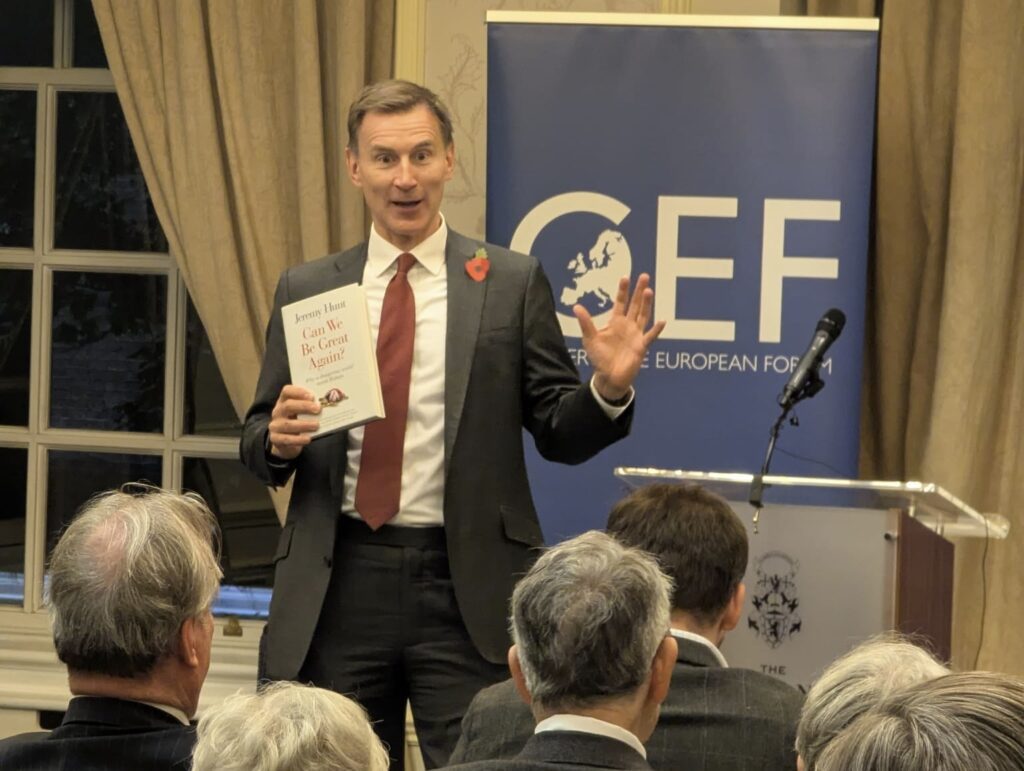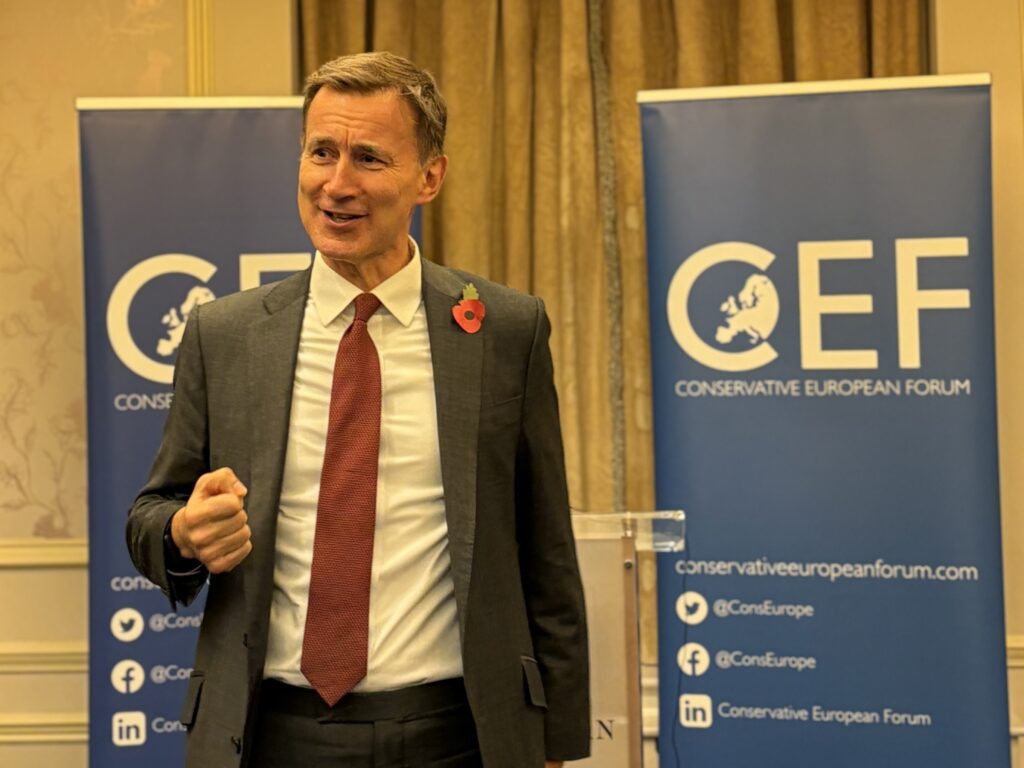Speaking at the Conservative European Forum (CEF), Sir Jeremy Hunt MP set out a vision for Britain as an enduringly influential global power. Reflecting on themes from his new book Can We Be Great Again?, Hunt argued that the UK remains one of the world’s most capable nations but must rebuild economic strength, lead with allies, and confront global threats with confidence rather than retreat.
“Can We Be Great Again?”
Opening with humorous anecdotes, Hunt recalled his time as Foreign Secretary, describing the grandeur of the Foreign Office and the question every new occupant asks: “Is this just an imperial delusion, or are we actually this amazing, strong, powerful, great country?”
His new book, he explained, was written to answer that question. It examines seven major global challenges – from democracy and climate change to migration and artificial intelligence – and assesses Britain’s influence in addressing them.
“In every single case, out of 193 countries in the United Nations, we were always in the top ten most influential nations – often in the top five.”
Sir Jeremy Hunt
That, Hunt suggested, is a truth the British often forget. Despite national pessimism, he said, the country still has profound global clout and strong fundamentals. The challenge is to turn that potential into renewed confidence.
Economic Strength and Political Power
Hunt linked global influence directly to economic performance. Drawing on forecasts from the Centre for Economics and Business Research, he noted that the UK is projected to remain the world’s sixth-largest economy in 2039 – behind only the United States, China, India, Japan and Germany.
“Even with all the doom and gloom, we’ll still be number six. We have the third-largest technology sector in the world. We should be a little more optimistic than the general mood suggests.”
Yet, he warned, economic strength and political clout are inseparable. Citing China’s rise as an economic superpower achieved “without firing a shot”, Hunt argued that Britain’s global influence depends on rebuilding fiscal discipline at home. He lamented the absence of a clear plan to reduce national debt which now costs every household nearly £4,000 a year in interest payments, compared to 800 euros for every German household.
His prescription was straightforward: never allow public spending to grow faster than the economy. “That’s how debt spirals,” he said. “We’ve been increasing welfare spending faster than national growth – and that is simply unsustainable.”
Confidence, Not Isolation
Hunt urged Conservatives and the wider country to resist self-doubt and insularity. Britain, he said, remains admired abroad for its integrity and global outlook, even as it indulges in national self-criticism at home.
“We are the global leader in washing our dirty linen in public,” he joked. “But we forget that other countries have challenges too.”
The book, he stressed, was not jingoistic. “This isn’t about claiming we’re better than anyone else,” he said. “It’s about recognising that the world is dangerous, and underestimating ourselves is the worst possible response.”

Hunt called for renewed co-operation with allies who share Britain’s democratic values: “The important thing is not to pull up the drawbridge but to roll up our sleeves and work with those who share our worldview.”
Rebuilding Relations with Europe
In discussion with Forum members, Hunt praised the Labour Government’s pragmatic diplomacy in improving relations with the European Union. This was a point that received wide appreciation from the audience. “Foreign policy may be where Keir Starmer’s greatest success lies,” he observed. “He’s managed to make friends with both Donald Trump and the EU – no small feat.”
Hunt argued that, after the “messy divorce” of Brexit, the war in Ukraine had helped both sides mature. The UK’s leadership in European security, he said, had “shown that we are good Europeans”. Though frustrated by new EU barriers to British participation in defence projects, he judged that relations were “broadly moving in the right direction”.
The US and Britain’s Global Standing
On the “special relationship”, Hunt adopted a pragmatic view. “Diplomacy is a cold-hearted, transactional business,” he said. The US values the UK because it can rely on us as a military partner prepared to project force overseas.
He cited former President Trump’s remark that “Britain would come to America’s aid if it were attacked” as an important compliment.
Around the world, Hunt added, Britain continues to command respect for its role in creating the post-war international order. “People look to us, even more so when America appears unpredictable,” he said.
Restoring the Centre Ground
Asked whether the Conservative Party could return to the centre, Hunt gave a candid assessment. Moderate parties globally, he observed, have been losing elections. “We need to look in the mirror,” he said. “People must see that elected politicians can actually solve problems faster and better than we did in office.”
While upholding moderate values – strong public services, climate responsibility and international development – Hunt said the party must also show toughness and radicalism in tackling challenges like illegal migration. “We must be both compassionate and effective,” he said.
Migration, Openness and Britain’s Future
Hunt described illegal migration as the issue most undermining Britain’s traditional openness. “For centuries, this country has thrived by welcoming the brightest and best,” he said. “A third of our Nobel Prize winners were born abroad.”
But he warned that public trust in that openness is “fraying”, and mainstream parties must restore confidence by proving they can control borders. Only then could Britain remain open to talent, students and investment.
“If we want to protect the virtue that made us great, we must also show that we can control who comes here.”
Sir Jeremy Hunt
He called for reform of the European Convention on Human Rights if necessary and urged co-operation with France and the EU on practical solutions, similar to the EU–Turkey agreement that curbed crossings in 2016.
China, Democracy and Dialogue
Hunt reflected on his personal connection to China and the global contest between democracy and autocracy. “Xi Jinping would say autocracies are better because they make long-term decisions,” he said. “That’s the argument we must defeat.”
He advocated a twin-track approach: “We need both strength and dialogue.” Britain, he argued, must engage China to prevent conflict and address shared challenges like climate change and bioethics. “There’s no solution to global warming without China,” he noted. “And we must work with them to set limits on technologies such as gene editing.”
Europe’s Security and Economic Challenge
On European defence, Hunt said leaders had so far acted wisely – increasing military spending and avoiding trade wars with the US. However, he warned that Europe’s dependency on America stems from economic stagnation.
“If we want to defend ourselves without cutting public services, we must understand why Asia and North America grow faster than we do – and act on it.”
He urged both Britain and the EU to revive long-stalled reforms in planning, welfare and productivity.
On the Next Budget
Asked what he would do as Chancellor today, Hunt sympathised with Rachel Reeves but warned against further tax rises. “Higher taxes will simply reduce economic growth,” he said. Instead, he called for major welfare reform, a productivity overhaul in the NHS, and a renewed focus on technical education for non-graduates.
He concluded with characteristic clarity, “We know what to do – it’s about having the courage to do it.”
“A Dangerous World Needs Britain”
Closing the evening, CEF chair, Stephen Hammond praised Hunt for reaffirming core Conservative values – fiscal responsibility, fairness, compassion and international co-operation.
Hunt’s central message resonated with the audience; Britain remains capable of greatness if it combines economic discipline with moral confidence and works alongside allies who share its democratic ideals.
“This is not the moment to retreat,” Hunt said. “It’s the moment to remember who we are – and what we can do when we act with our friends to make the world safer and freer.”
To find out more about Sir Jeremy Hunt’s book, visit Swift Press.

